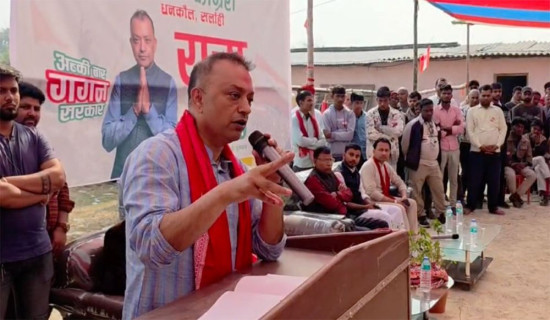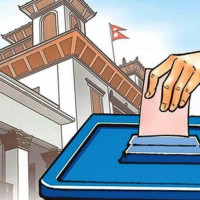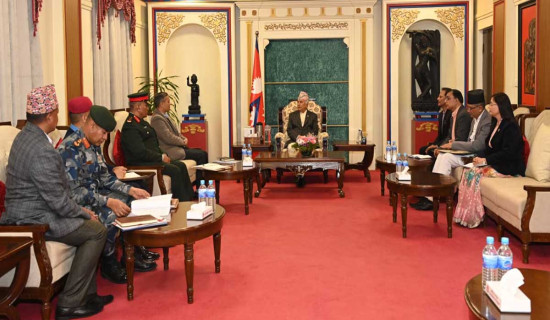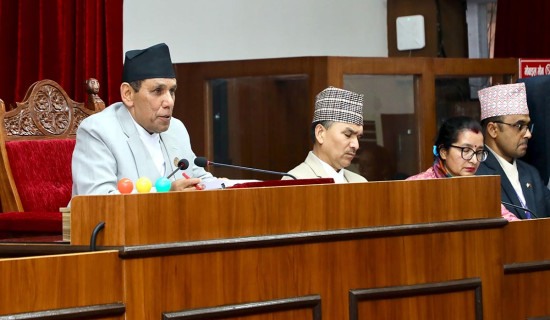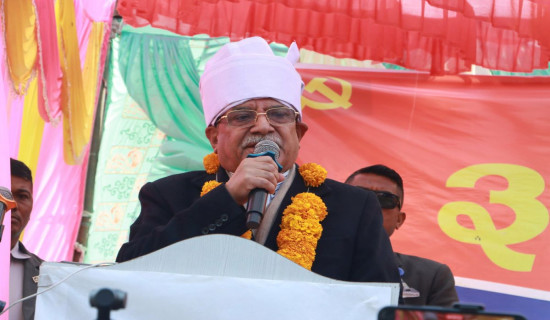- Saturday, 14 February 2026
Red Panda Protection Drive In Khotang
The endangered red panda (Ailurus fulgens), known locally as 'habre' or 'kudo', found in the forests of Khotang in Nepal, challenges the imminent threat of extinction. With an estimated population of approximately 500 red pandas in Nepal and fewer than 10,000 globally, this distinctive reddish-brown, bushy-tailed mammal faces significant challenges stemming from hunting, habitat loss due to deforestation, and the pervasive impacts of climate change.
Conservation initiatives spearheaded by the Khotang community, focusing on protecting red pandas and their crucial bamboo habitat, exemplify effective strategies in mitigating these threats.
High up in the mountains, between 2,200 and 4,800 metres, red pandas make their homes in forests packed with bamboo. Nepal has a big piece of its world—about 24,000 square kilometres across 24 districts—but most of it isn't safe from logging or new roads. In Khotang, bamboo is the red panda's main food, and losing it puts them in danger. Experts say Nepal has 317 to 582 red pandas, though some think the number could be as low as 237 or as high as 1,061. In nearby areas like the Chitwan-Annapurna Landscape, only about 75 red pandas remain, showing how tough things are for them.
Red pandas are on a global danger list, marked as endangered since 2008, because their numbers have dropped by more than half in a few decades. Nepal's laws are strict: hunters can face up to 10 years in jail or a $3,700 fine. The country's big nature plan from 2014 to 2020 calls red pandas a top priority, pushing everyone to help save them.
The spark for Khotang's mission lit up in 2022 when Patheka's Merung Community Forest folks spotted red pandas scampering through the trees, confirmed in 2024 with drones and photographs.
They rushed to tell Tirtha Raj Bhattarai, the mayor of Diktel Rupakot Majhuwagadi. "When we heard they were here, we got so excited," Bhattarai said. "We knew we had to protect them." He worked with the local forest office to make a plan to save the red pandas and their bamboo forests. One big problem was that some people were hunting red pandas for food, unaware they were rare.
The town started compensating families to keep the animals alone to stop this. "It's working like a charm," Bhattarai said. "Now people think red pandas are special."
Bamboo is the key to preventing red pandas from becoming extinct, so Khotang is cultivating it widely.
In 2023, it organised a Bamboo Conference in Halesi, where 200 farmers, government representatives, and nature lovers shared ideas for planting more bamboo.
"Bamboo feeds red pandas and keeps our forests healthy," said Rajendra Rai, a FECOFUN member. Since then, Khotang has planted 10,000 bamboo plants in Merung and other spots, with plans to add 5,000 more by 2026. These new plants give red pandas plenty to eat and strengthen their homes.
The real magic happens with the people of Khotang. Groups like the Red Panda Network (RPN) and Nature Conservation Initiative Nepal (NCI-Nepal) are teaching young folks to be "citizen scientists". More than 30 people on average in a month hike through the forests, counting red pandas and checking on bamboo. "I get such a thrill spotting their little footprints," said Surya Rai, Red Panda Conservationist. He further added, "It feels like I'm saving them." RPN also looks after 127 community forests, covering 30,000 hectares, and has planted over 800,000 trees since 2019, with a goal of 150,000 by 2025. These trees, especially bamboo, create cosy homes for red pandas.
Khotang hosted a vibrant Red Panda and Thar Mahotsab on April 13–14, 2024, in Hurlung to rally community support. More than 500 locals gathered to dance, share food, and learn about the importance of red pandas.
Popular actor and red panda advocate Dayahang Rai energised the crowd, "Red pandas are our forest friends. We must protect them and their bamboo," said Rai.
Forest guards like 25-year-old Prem Rai are heroes, too. They walk 10 kilometres daily through Merung and other forests to scare off hunters. "If we see someone hunting, we tell them about the big fines," Prem said. RPN also vaccinates stray dogs that might hurt red pandas and gives families better stoves that use less wood. Since 2022, 200 stoves have saved 1,000 trees a year in Khotang. The group WWF helps yak herders use cow dung for fuel instead of chopping trees, and some villages close forests from June to August when red pandas have their babies, giving them peace.
Nepal's Red Panda Conservation Plan (2019-2023) supported Khotang with $2.25 million to study red pandas, stop hunters, and plant bamboo. It also collaborates with India and China to protect red pandas across borders. In 2021, the Panchthar-Ilam-Taplejung area became the world's first red panda protected forest, with 50 guards, including 10 from Khotang, keeping watch along the Nepal-India border.
But it's not all smooth sailing. A new road planned near Merung could wreck red panda homes. Five red pandas were killed by hunters in Khotang in 2023. "We need stronger rules," said Rajendra Rai, a FECOFUN member from Khotang. "And we have to plan roads so they don't hurt forests." Changing weather is another worry, as it could make bamboo harder to grow.
Mayor Bhattarai has a big dream. He plans to join the Mundhum Trail from Hurlung to Chakhewa, opening in 2026. "Tourists will come to see red pandas and our beautiful forests," he said. The trail will create jobs for guides and homestays, with 10 per cent of the money going to save red pandas. "It's good for our people and animals," Bhattarai added.
Protectors like Surya Rai, Prem, Rajendra Rai, and Mayor Tirtha Raj Bhattarai lead a community-based campaign in Khotang to save the endangered red pandas. By planting bamboo, conducting anti-poaching efforts, and educating people about the red pandas, they ensure that pandas are protected for future generations.
(The author hold a Bachelor's degree in Forestry.)






